Safeguarding Your Kitchen: Preparing for the Unpredictable

In an unpredictable world, being prepared for severe weather and unexpected events is not just a good idea; it's a necessity. One of the most crucial aspects of this preparation is food storage and safety. This handy guide will walk you through the essentials of food storage, ensuring that you and your family have access to safe and nutritious meals even during challenging times.
Food Storage Basics
When it comes to food storage, the first step is to understand the different types of food and their storage requirements. Non - perishable foods such as canned goods, dry pasta, rice, and cereals are excellent choices for long - term storage. These items have a long shelf life and can be easily stored in a cool, dry place.
Canned goods should be inspected regularly for any signs of damage, such as dents, bulges, or rust. If a can shows any of these signs, it's best to discard it immediately, as it may contain harmful bacteria. Dry goods like pasta and rice should be stored in airtight containers to prevent moisture and pests from getting in.
Perishable foods, on the other hand, require more careful handling. Fresh fruits and vegetables can be stored in the refrigerator, but it's important to keep them properly organized. Use crisper drawers to store produce, and make sure to separate ethylene - producing fruits (such as apples and bananas) from ethylene - sensitive vegetables (such as lettuce and spinach). This will help prevent premature spoilage.
Food Safety During Power Outages
Severe weather often brings power outages, which can pose a significant risk to food safety. In the event of a power outage, it's crucial to keep the refrigerator and freezer doors closed as much as possible. A full freezer can keep food frozen for up to 48 hours, while a half - full freezer can keep food frozen for about 24 hours.
Once the power is restored, check the temperature of the refrigerator and freezer using a thermometer. If the refrigerator temperature has risen above 40°F (4°C) for more than 2 hours, discard any perishable food. For the freezer, if the food still has ice crystals, it can be refrozen, but it's important to note that the quality may be affected.
How to Cook During Emergencies
Even in the midst of a severe weather event or unexpected situation, you can still prepare delicious and nutritious meals. If you have a gas stove, it may still be operational during a power outage, as long as the pilot light is lit. You can use it to cook simple meals such as soups, stews, and scrambled eggs.
If you don't have a gas stove, there are other alternatives. A camp stove can be a great option for outdoor cooking. You can cook a variety of dishes on a camp stove, from grilled sandwiches to pasta dishes. Make sure to use the camp stove in a well - ventilated area to avoid carbon monoxide poisoning.
Another option is to use a solar oven. Solar ovens are a sustainable and eco - friendly way to cook during emergencies. They use the sun's energy to cook food, and they can be used even on cloudy days. You can cook a wide range of foods in a solar oven, including bread, cakes, and roasted vegetables.
Recipes for Emergency Cooking
Here are some simple recipes that you can make using the ingredients in your emergency food storage:
1. Canned Soup with Crackers
Open a can of your favorite soup and heat it on the stove or in a camp stove. Serve it with crackers for a quick and easy meal. You can also add some shredded cheese or a dollop of sour cream for extra flavor.
2. Pasta with Canned Tomatoes and Tuna
Boil some dry pasta according to the package instructions. Drain the pasta and add it to a pan with canned tomatoes and tuna. Heat the mixture on the stove and season with salt, pepper, and a little bit of garlic powder. This is a quick and nutritious meal that can be made with just a few ingredients.
3. Solar - Baked Apples
Core some apples and place them in a baking dish. Sprinkle them with cinnamon, sugar, and a little bit of butter. Place the baking dish in the solar oven and let it cook for about an hour. The result is a delicious and healthy dessert that can be enjoyed even during an emergency.
In conclusion, being prepared for severe weather and unexpected events is essential for ensuring the safety and well - being of your family. By following these tips on food storage, safety, and cooking, you can be confident that you'll be able to handle any situation that comes your way.